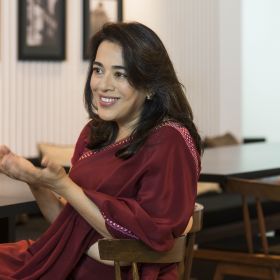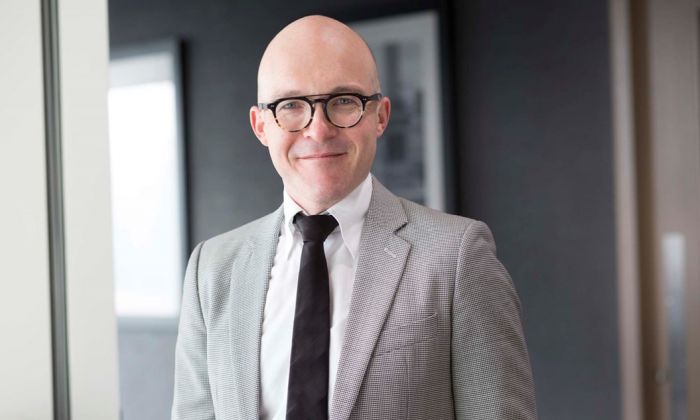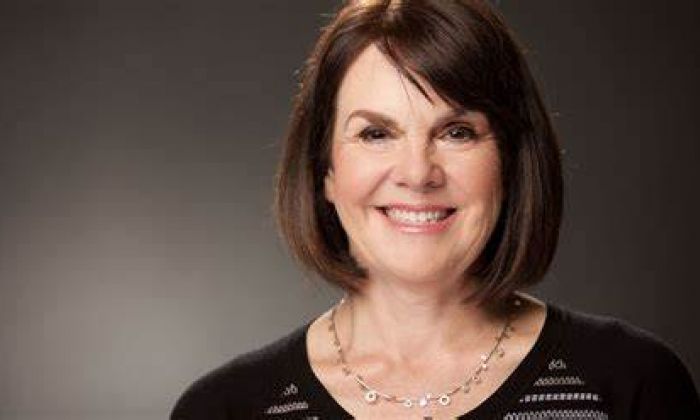Interview with Ela Bhatt
“How can we live in a world where people go to bed hungry every night? How do we bear it?”

1
Forty years ago Ela Bhatt founded the first trade union for the millions of Indian women who work to feed their families without the benefit of wage agreements, pensions, health insurance, and paid vacations. In an interview with FOCUS, this “gentle revolutionary” explained why it is essential that the poor and disenfranchised speak with a collective voice – and why women should take a leading role in the development of society.
的Focus:What was it, more than 40 years ago, that led you to take up the cause of the millions of women working for starvation wages in the streets and markets or in their homes to feed their families – women who were not officially classed as “workers” because they had no employer?
Ela Bhatt:At the time I was working as a lawyer for the textile workers’ union. The machine workers in the factories were almost exclusively men. In 1968 two major textile factories were closed; suddenly thousands were without work and lost their income. Working on behalf of the union, I was investigating how these closures were impacting the workers’ families. When I visited the laid-off workers in their homes I quickly realized that the entire responsibility for the family had been shifted to the women.
的Focus:Had the men relinquished their responsibility?
Bhatt:No, but they were no longer in a position to fulfill it by providing a living for their families. They went to demonstrate against the factory closures but they did not bring in any income. It was the women who ensured that a little money was coming in and that everyone had just about enough to eat. At a fundamental level, the situation is almost unchanged today. Among the poor sections of the population you may find unemployed men, but you’d be hard pressed to find a woman who isn’t working. Some are working without pay, others for a few rupees, but they all have one thing in common: they are undertaking productive work and taking responsibility for their families by doing so. Europeans and Americans sometimes find it difficult to understand why these women take the leading role in the family. After all, from their earliest childhood they are the ones who are made to feel that they have less to expect from life.
“From their earliest childhood women are the ones who are made to feel that they have less to expect from life.”

的Focus:Because they are disadvantaged in the working world?
Bhatt:Not just there. A girl from a poor family in India is disadvantaged from birth onwards. She gets less of everything – whether it’s food, toys, time, or education. And yet later, as a young person and as an adult, she’s the one who holds the family together, even when she’s ill or pregnant. She cooks, fetches water, takes care of her own children or younger siblings; she keeps the hut clean, feeds and milks the animals. She repairs the roof, works in the field, and makes clothes. She’s the last one to go to bed at night and the first one to get up in the morning.
的Focus:What kinds of work were the women doing when you visited the families of the laid-off textile workers?
Bhatt:Some were out in the streets and alleys collecting rags – that was the very lowest form of work. Others were selling fruit and vegetables at the market, producing embroidery at home on a piecework basis, or rolling cigarettes. Many were sleeping at night on muddy footpaths and getting up at dawn to look for work in railway stations or warehouses. Others exchanged hardware they had purchased on credit for second-hand clothing in the wealthy districts; at home they washed, repaired, re-styled, and ironed these garments and then re-sold them.
的Focus:When you saw this with the eyes of a committed unionist, what went through your mind?
Bhatt:I saw exploitation in all its forms. The women had no health insurance and they received no pension in their old age. They had no rights in terms of vacation or regulated working hours. In many cases half of what they earned went straight to the middle man who first brought the women from the country to the city. Basically their jobs didn’t really exist; officially they were classed as “not gainfully employed.” Once a woman said to me: “I don’t have any work, but the daily grind of the work I do is killing me!” These words etched themselves in my memory, because they sum up the situation of India’s working poor: a life full of hard work – but work that brings in so little that there’s no hope of ever leaving poverty behind.
的Focus:And that prompted you to try and change the situation?
Bhatt:Yes. I couldn’t stop thinking about these women and their fate. It was clear to me that I had to do something. As individual workers they were invisible, isolated, and totally powerless. They urgently needed a collective voice in society.

的Focus:What did you hope to change by giving the women a collective voice?
Bhatt:Initially, it was literally about these women making themselves visible and being heard, about bringing them out of isolation. When a working woman joins forces with other working women she gains self-respect. She is no longer alone. And she recognizes for the first time in her life not just that she’s doing work but that she is a worker, a producer, that she’s contributing to the country’s economic performance – she isn’t just somebody’s wife, mother, or daughter.
的Focus:Why did this connecting to others need to be in the framework of a union? After all, there wasn’t even an employer to agitate against.
Bhatt:In a union it’s not the for and against that matters most, but the coming together, the collective consciousness, and the formulation of collective interests. You don’t have to have a factory owner on the other side of the table to do that. These working women didn’t join forces against someone, they did it for themselves. By creating the union they laid claim to their status as workers for the first time. It was also my aim that they should be entitled to the same rights as the organized workers in the factories. That’s why starting a union made sense.
的Focus:Presumably your plans were not greeted with unqualified enthusiasm by the union you worked for, the Textile Labor Association…
Bhatt:政治和商业,我们的决策者ll as in the unions thought – and still think – of employment mainly in terms of industrial work. The relationship between employer and employee is the only one they can really understand. Yet in developing countries millions of workers don’t have an employer in the standard sense. It was very, very difficult to convince the union management that these people are employed workers too. The union registration body even said: “What’s the point of a union for people who aren’t employed? Who will they agitate against?”
的Focus:So it ended in disagreement?
Bhatt:Yes. The union we had founded in 1972, the Self-Employed Women’s Association, was tolerated under the umbrella of the TLA textile workers’ union for a few years. But in 1981 the TLA leadership informed me that we would have to close our office at the union headquarters. They threw us out! For me this was a parting of ways with the union where I’d worked for more than 20 years. I felt disappointed and betrayed. At that point, women simply didn’t matter to the union. They represented only four percent of the workforce in the textile factories.
“Advances like these raise women’s consciousness – and that’s something no one can take away from them.”

的Focus:Four decades have passed since the foundation of SEWA. Have you succeeded in achieving your original goals?
Bhatt:I don’t think in terms of success or failure – that way of thinking is alien to me. But of course some things have changed for the better. Soon after our union was founded, the wages for piecework increased by an average of 30 percent. This was a good start, of course. SEWAhas grown from being a niche organization into the country’s largest union. In 1982 we had 6,000 members – today we have more than one million. People who work at home or in the streets now at last have an official ID and social security. The women receive payments if they are ill or have an accident at work. Advances like these raise women’s consciousness – and that’s something no one can take away from them.
的Focus:Initially SEWA recruited its members mainly in towns and cities. Were the problems faced by women in rural areas less important to you?
Bhatt:的y were just as important – but we couldn’t do everything at once. Today we have more members in rural than in urban areas. We help them form cooperatives, strengthening their position financially and in relation to the buyers of their products, improving their access to loans and insurance, and facilitating shared childcare arrangements. Many of the women who are organized in cooperatives now earn twice as much as they did before. But it’s still a struggle.
的Focus:SEWA Bank is regarded as a pioneer in the microfinance sector. What were the ideas behind its creation?
Bhatt:Back in the days when I was visiting the families of laid-off textile workers, I realized that every woman I spoke to was in debt. This was because the tools the women used for their work did not belong to them. They had to rent the sewing machine, hand cart, even their work clothing – paying interest rates of 20 percent or more per day for the privilege! A woman selling vegetables in a city market, for example, first has to borrow $1.50 from a moneylender early in the morning – otherwise she can’t sell her produce. At the end of the day she has earned, say, three dollars – two of which go straight to the moneylender. Poor families depended on moneylenders for every purchase. There simply wasn’t any alternative for them – until we founded the SEWA Cooperative Bank.

的Focus:希银行是bank exclusively for women. Why are men excluded?
Bhatt:因为女性更善于理财。因为在dia at least there are studies that prove this conclusively. A woman who has 100 rupees will spend 96 of those rupees on the family, on food, clothing, schoolbooks, and so on. If the same amount is given to a man he takes more than half of it for himself, primarily for cigarettes and alcohol. For me this means that the family income belongs first and foremost in the women’s hands. Many of the women had good reasons for wanting to keep the family income out of their husbands’ reach. If their husbands were in the union this would hardly have been possible.
的Focus:So should women play a major role in the way society develops going forward?
Bhatt:Not just a major role, but a leading role. Women have always proved themselves the better fighters in natural disasters and times of crisis. It’s in the female sex that I see hope for the future. Women should be at the heart of all economic and social reforms. I believe poor women in particular are the key. For a long time they had to depend entirely on themselves. And even though no one helped them, they survived. They have a resourcefulness, a natural intelligence, that ensures survival. These people have developed their own system independent of the one run by the wealthy and other social classes. If we help them take the initiative, if we give them access to capital and the means of production, then one day they or their daughters will be able to leave behind their meager huts and their life of poverty. That’s the way our society will develop and our economy will grow: one woman at a time.
的Focus:In the 1980s you were a member of the upper house of India’s Parliament for three years. Was this a deliberate attempt to influence politics at the highest level?
Bhatt:I hadn’t planned this brief political career. One afternoon Rajiv Gandhi, our prime minister at the time, called me and said he was going to nominate me for the upper house. At first I felt somewhat lost in Parliament. I listened to the debates and felt rather useless. But once I’d learned the ropes I took up the cause of child labor and workers in the informal sector. Those were my issues – my home territory.
Perhaps my work helped alert our prime minister to the plight of working women. Rajiv Gandhi established a major national commission, with me as its chair, to look at self-employed women in the informal sector. The commission’s work played an important part in bringing women out of the shadows in official terms as well.
“Unless the poor in society can participate in political power we will never succeed in eliminating poverty.”

的Focus:You’ve devoted a large part of your life to the battle against poverty. Looking beyond SEWA for the moment: How can we give poor people a stronger presence in society without making decisions on their behalf?
Bhatt:的battle against poverty is above all a question of political participation. Poverty isn’t a God-given problem; it is man-made and therefore always a political question. For me it’s the political question. My position is very clear: unless the poor in society can participate in political power we will never succeed in eliminating poverty. And it’s important that the poor themselves play a part in planning assistance programs. The money must flow into their hands.
的Focus:So you’re skeptical about large-scale government programs?
Bhatt:I think there’s the danger of patronizing people, of robbing them of their capacity for action. Moreover such programs are not efficient, by and large, unless the infrastructure on the ground, in the urban slums and in the villages, is developed at the same time. The whole thing works to some extent while the state agencies are in situ – but as soon as their people move out it all collapses again. Large sums of money are pumped into programs that achieve very little.
的Focus:的idea of strengthening village communities is a recurrent theme running through your talks and publications. This includes the “100 mile principle.” What does that involve?
Bhatt:Important products and services such as hospitals, institutions of higher education, and banks are often only available far away from villages. This makes them unreachable and unaffordable for many villagers, which in turn increases the pressure to migrate to the cities. Services and facilities like these should be provided locally within a radius of 100 miles, or about 160 kilometers. This makes the return journey – even by bus – feasible on the same day. If the village economy is growing on its own account and a certain level of buying power is achieved as a result, the demand for more advanced education for the villagers’ children also increases. And education, after all, is one of the keys to escaping poverty.
的Focus:But there’s a school in almost every village…
Bhatt:Yes, but how long a child goes to school depends on the situation in the family – and mainly on whether the child is needed at home. Girls generally leave school earlier than boys because they’re needed to look after their younger brothers and sisters at home while their parents work, for example. But without completing school they won’t have the chance to get better-paid jobs in the formal sector at a later stage. Someone who can barely read and write will only have access to simple manual work which is poorly paid.
的Focus:Are you an opponent of globalization?
Bhatt:I’m not so naïve as to think that globalization is something we can hold back at this stage. But I can see what it means for our customers here in India. Emerging and developing nations now have to compete with each other and with the industrialized nations. In India the result is that permanent jobs are increasingly being scaled back as the work is transferred to back-yard operations and homes. I’m advocating a more gentle economy, an economy based on human well-being. How can we live in a world where people go to bed hungry every night? How do we bear it? Perhaps now and then we should stop and think before we go racing ahead, modernizing the world, and should look more closely at the traditional economic and social structures we are sacrificing and allowing to collapse in the name of progress and human development.

的interview with Ela Bhatt in Ahmedabad was conducted byNamrita Shahani Jhangiani, Egon Zehnder, Mumbai, and Arjun Srivastava, Egon Zehnder, New Delhi.

Ela Bhatt
出生于一个特权的婆罗门家庭艾哈迈德abad in 1933. She completed her law degree in 1954 and then worked in the legal department at TLA, the textile workers’ union founded by Mahatma Gandhi. She soon realized that the union only helped people in formal employment and that everyone working in India’s informal economy – 93 percent of all Indians, and 94 percent of all working women – enjoyed no welfare protection of any kind. In 1972 she founded the Self-Employed Women’s Association (SEWA) with the aim of giving women working in the informal sector access to basic workers’ rights and to banking and other services. Today more than one million women are members of SEWA. The SEWA Bank specializes in microcredit, giving the women access to finance for land, production resources, and education. Ela Bhatt’s work has refuted many myths of the banking trade. She has proved, for example, that poor people are much more likely to repay their debts than ordinary borrow-ers (98 percent of them do). SEWA’s operations have extended to many countries, including Afghanistan, South Africa, and Pakistan.
PHOTOS: MICHAEL HUDLER







